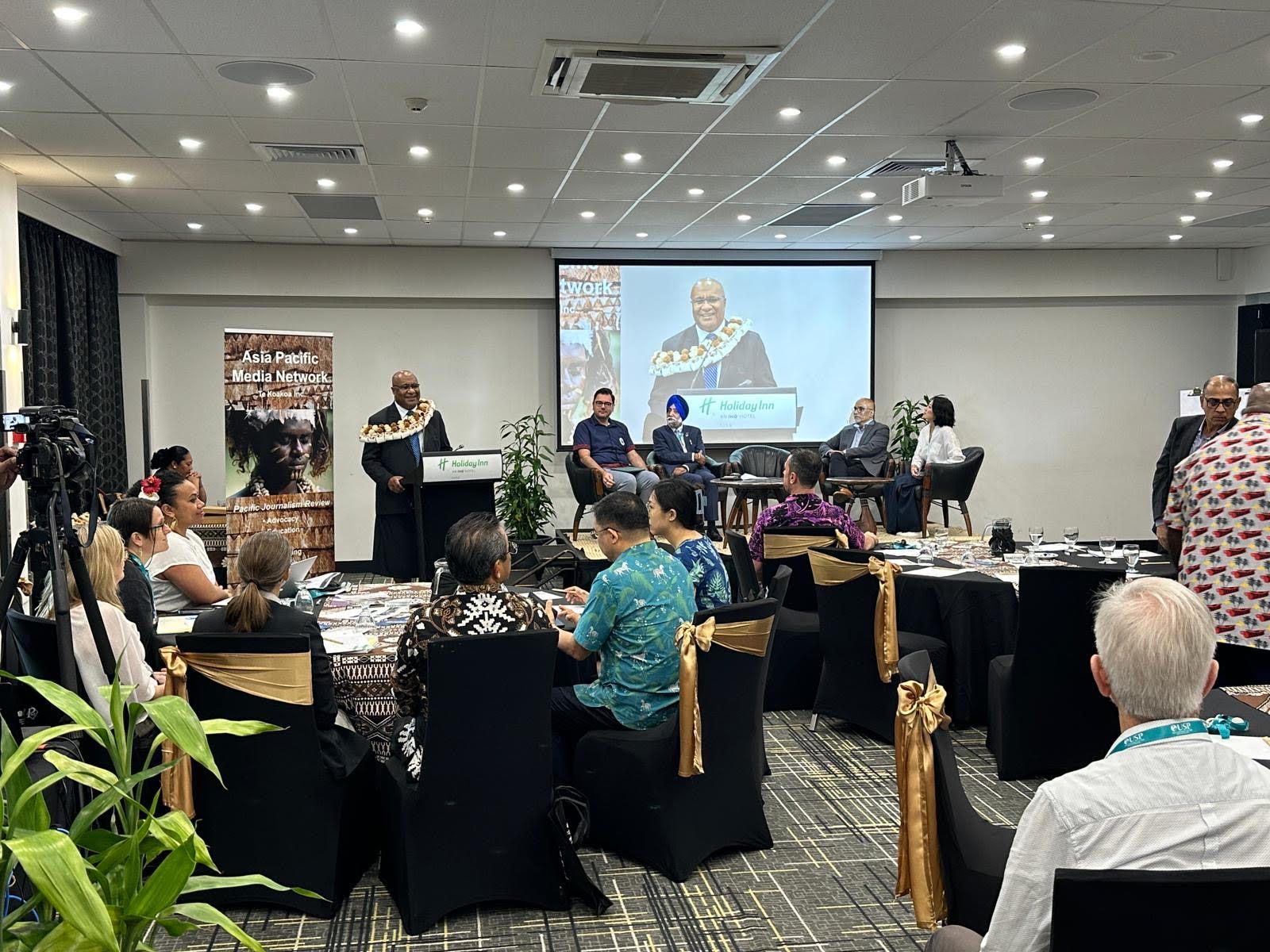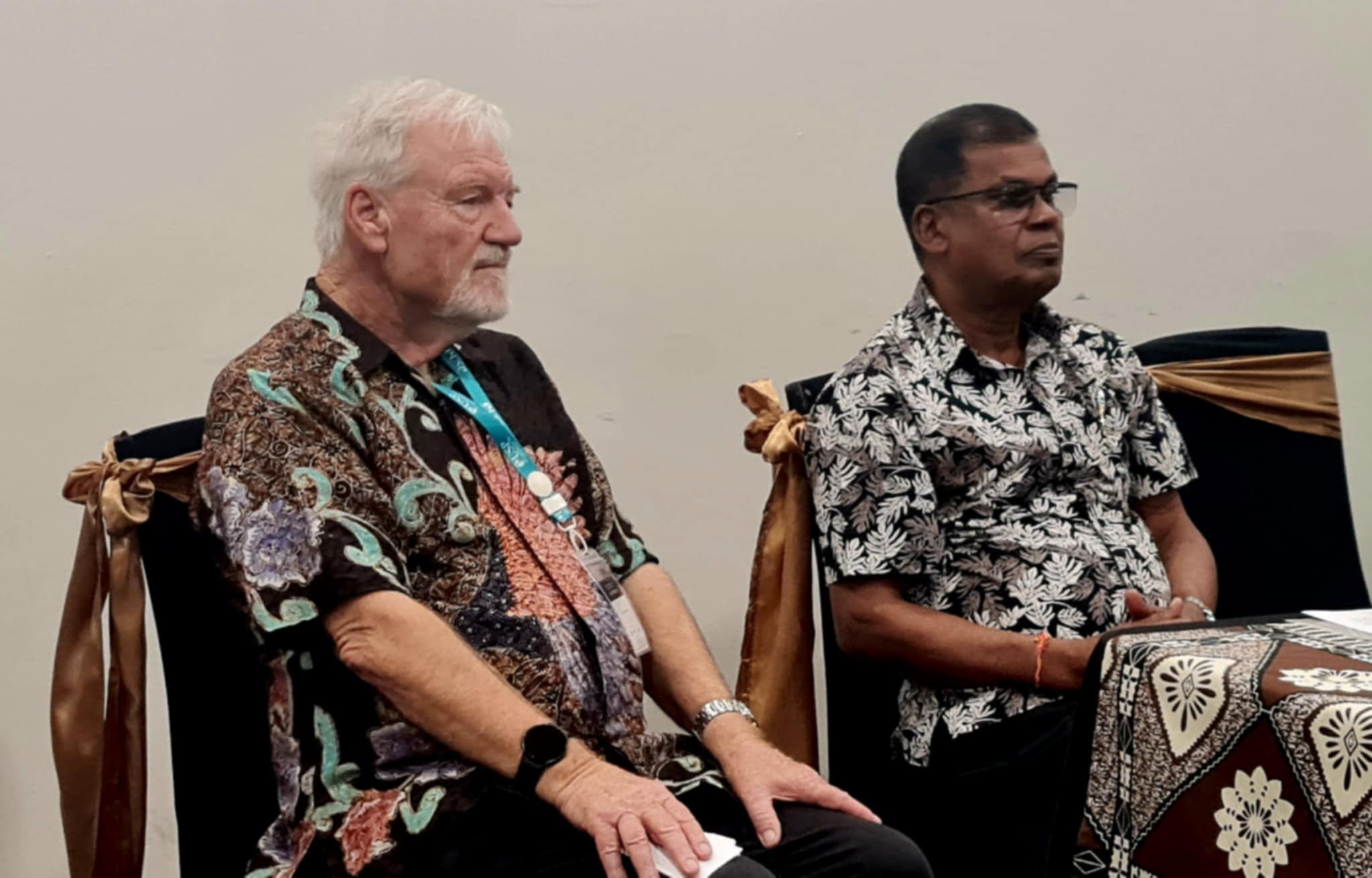By Khalia Strong of Pacific Media Network News
If the pen is mightier than the sword, then an army of journalists has assembled in Fiji’s capital to discuss the state and future of the industry in the region.
The three-day Pacific Media Conference 2024 on July 4-6 is organised and hosted by the University of the South Pacific, in collaboration with the Pacific Islands News Association (PINA) and Asia Pacific Media Network (APMN), with more than 50 speakers from 11 countries.
A keynote speaker and veteran journalist Dr David Robie, editor of Asia Pacific Report, says the conference is crucial.
- READ MORE: Other Pacific Media Conference reports
- Full Radio 531pi interview with Dr David Robie on Pacific Mornings
“It’s quite a trailblazer in many respects, because this is probably the first conference of its kind where it’s blended industry journalists all around the region, plus media academics that have been analysing and critiquing the media and so on.
“So to have this joining forces like this . . . it’s really quite a momentous conference.”
Dr Robie is a distinguished author, journalist and media educator and was recognised last month as a Member of the New Zealand Order of Merit (MNZM) for his contribution to journalism and education in New Zealand and the Asia-Pacific region for more than 50 years.
Speaking to William Terite on Radio 531pi’s Pacific Mornings, Dr Robie said the conference was a way to bolster solidarity to others in the industry and address common challenges.
“In many Pacific countries a lot of their fledgling institutions, and essentially, politicians, have no understanding of media generally, and have a tendency to crack down on media when they have half a chance.
“So it’s partly to get a much better image of journalism and how important journalism is in democracy and development in many countries in the Pacific.”

Turning the page for media
The conference theme is “Navigating challenges and shaping futures in Pacific media research and practice”.
In April last year, Fiji revoked media laws that restricted media content. PMN chief-of-news Justin Latif is attending the conference, and said Fijian media were in celebration-mode, saying “democracy has returned to Fiji”.
“They talked about how such a conference had happened under previous regimes, basically the police and army would have had a presence there and would have been just noting names and checking up that nothing was said that was anti-government.”
Latif said regional journalists showed a deep sense of purpose and drive.
“People do see their roles as a calling, and so often are willing to take less pay and harder conditions,” he said.
“They see their job as building their nation and being part of helping strengthen the country, and so it’s probably quite different if you were to get a group of journalists together in New Zealand, they probably wouldn’t have quite the same sense of that kind of fervour for the role in terms of what it can mean for the country.”
The Pacific Journalism Review, a journal examining media issues and communication in the region, celebrated its 30-year anniversary. It has published hundreds of peer-reviewed articles and is regularly cited by scholars.

Global tussle for Pacific attention
The United States is one of the main funders of the conference, and there are representatives from some Asia-Pacific countries such as Hong Kong, Indonesia, Malaysia and Taiwan.
Latif said China’s involvement in Pacific media was openly questioned by the US deputy chief of mission, John Gregory.
“He gave a very detailed breakdown of all the ways that China are influencing elections: using Facebook to spread misinformation to try and basically encourage the three Pacific nations who still support or maintain diplomatic ties with Taiwan, how they’re trying to influence those nations to have a regime change, and it was quite shocking information about the lengths that China is going to, or that the State Department believed China is going to.”
The United States in putting investment into journalism in the Pacific, said Latif, sending 13 journalists from Fiji to the US for exchanges.
“There is a clear US agenda here about wanting the media to be strengthened and to be supported so that they can have a strong foothold in the Pacific, because the influence of China is definitely being felt.”
A bold, future vision for Pacific media
Dr Robie has described the current state of news media in the Pacific as “precarious”, and warned some nations can be susceptible to “geopolitics and the influences of other countries”.
“We’ve got China trying to encourage media organisations to be very much under an authoritarian wing, taking journalists across to China . . . but now we’re getting a lot more competition from Australia and the US and so on, upping the game, putting more money into training, influencing, whereas for many years they didn’t care too much about the media in the region.
“Journalists very often feel like they’re the meat in the sandwich in the competition between many countries, and it’s not good for the region generally.”
Dr Robie has worked across the Pacific, including five years as head of journalism at the University of Papua New Guinea, and then as the coordinator of the journalism programme at USP.
He encouraged Pacific media to continue upholding democratic values while holding leaders to account.
“Most media organisations in the Pacific are quite small and vulnerable in the sense that they’ve got small teams, limited resources, and it’s always a struggle, to be honest, and things are probably the toughest they’ve been for a while.
“Pacific countries and media need to stand up tall and strong themselves, be very clear about what they want and to stand up for it, and not be overshadowed by the influence of major countries.”
The conference ends on Saturday.
Republished from PMN News with permission.
This post was originally published on Asia Pacific Report.